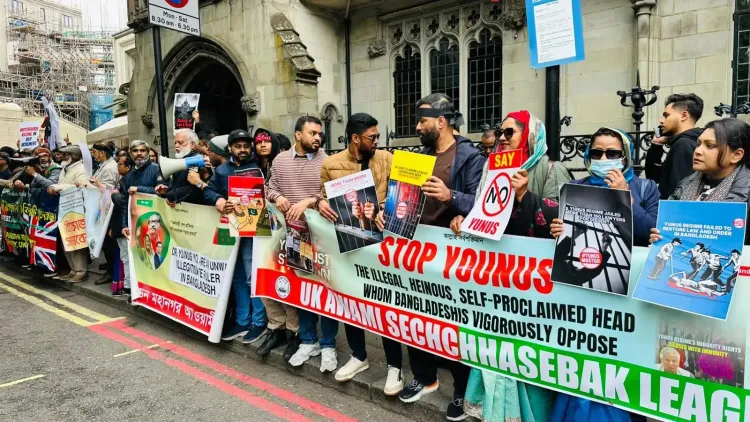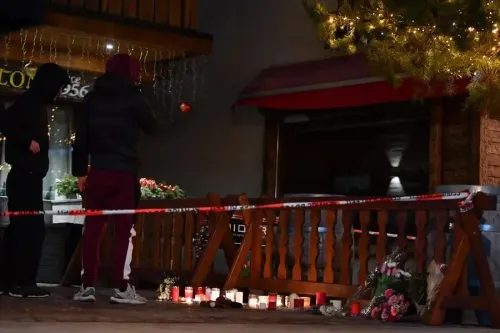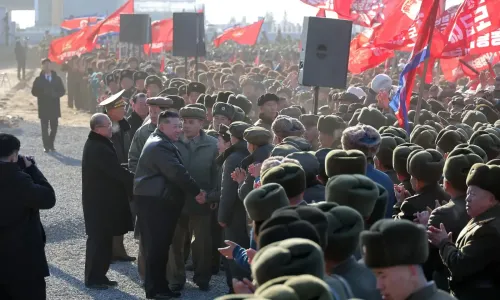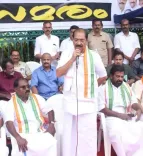Is Bangladesh's 'unelected leader' Yunus welcome in the UK?

Synopsis
Key Takeaways
- Yunus' visit has sparked widespread protests in the UK.
- Accusations of political repression under Yunus' regime are prevalent.
- The Awami League's exclusion from politics raises concerns about democracy.
- Human rights violations are a critical issue, especially for women and minorities.
- The UK government's recognition of Yunus could damage its democratic credibility.
London, June 10 (NationPress) As Bangladesh's interim government Chief Advisor Mohammad Yunus embarked on a four-day visit to the United Kingdom, hundreds of demonstrators assembled outside Heathrow Airport and a Central London hotel.
Wielding black flags and signs proclaiming "Yunus is a killer of freedom fighters of Liberation War", the protestors chanted slogans like "Go back Yunus", accusing him of fostering militancy and radicalism in Bangladesh.
Some protestors also called for the immediate release of detained Hindu priest Chinmoy Krishna Das, suggesting that it should be Yunus who faces trial instead.
Eyewitness accounts reported that many demonstrators, primarily from the Awami League and Bangladeshi expatriates in the UK who fled their homeland due to Yunus' rise to power 10 months ago, even threw shoes and eggs at his convoy as it traveled from the airport to the hotel.
The protestors vowed to remain outside the hotel and rally at locations where Yunus would hold meetings, including outside Chatham House on Wednesday and an all-day demonstration outside the UK Parliament on Thursday.
They also expressed deep discontent with UK Prime Minister Keir Starmer for reportedly arranging a meeting with Yunus, cautioning that any formal engagement would lend legitimacy to an unelected and unconstitutional regime.
In this context, a formal letter from the Awami League's UK branch has been dispatched to Downing Street, the Speaker of the House of Commons, the King's Foundation, and the Commonwealth Secretariat, urging British officials not to acknowledge Yunus' administration.
The letter emphasized that as Bangladesh grapples with economic decline, escalating political repression, and increasing human rights violations—especially against women and girls—the UK government's decision to engage with Yunus poses a threat to the integrity of democracy and the rule of law.
"Tensions have escalated due to the recent banning of the Awami League by the Yunus government, which marks a troubling departure from democratic principles. The Awami League is one of Bangladesh's founding parties, enjoying support from millions of citizens and expatriates. Just last week, Yunus announced general elections for April 2026. However, even if this promise is fulfilled, the forced exclusion of the Awami League from political engagement will render the election fundamentally undemocratic," the letter stated.
Bangladeshis in the UK alleged that even the freedom of the press in their homeland is facing unprecedented assaults, with journalists supporting the Awami League arrested and politically motivated charges leveled against at least 140 others. The Human Rights Watch (HRW) has also brought attention to a concerning trend of vague or mass criminal complaints filed by authorities, facilitating the arbitrary detention of thousands, primarily targeting Awami League supporters.
In the aftermath of the student-led quota movement, the country has plunged into violence and instability. Over 2,000 attacks against Hindus and other minorities were recorded in the three months following last summer's protests, and this number continues to rise. Women and girls are disproportionately affected, with a marked increase in child rape incidents early in 2025 and the cancellation of a girls' football tournament due to pressure from Islamist factions.
Simultaneously, civil unrest is on the rise. Recently, public sector workers have protested against unpopular reforms, contributing to widespread dissatisfaction. The nation's previously robust economy, credited with lifting millions out of poverty, has been downgraded by the IMF, which warned that GDP growth has plummeted from 5.1% to 3.3%, reflecting economic disruptions triggered by the popular uprising, a stricter policy environment, and increased uncertainty impacting investment. The IMF has also cautioned Yunus that he must enhance governance and transparency and ensure that his legal reforms align with international standards.
"It is ironic and extraordinary that an unelected leader is visiting the home of modern parliamentary democracy and anticipating a warm reception. This visit risks exacerbating tensions in both Bangladesh and the UK, which hosts a substantial Bangladeshi diaspora. By granting credibility to such a regime, Keir Starmer would jeopardize the UK's status as a champion of democratic values," remarked Mohd. Arafat, spokesperson for the Awami League.
"We urge the UK Government and His Majesty the King to press Yunus to commit to elections that are free and fair, rather than rigged against his critics. He must lift the ban on the Awami League, facilitate multi-party participation, and respect the democratic wishes of the Bangladeshi populace," Arafat added.
Notably, Bangladesh's Islamist radical party Jamaat-e-Islami continues to gain traction in the UK, bolstered by its significant following and organizational framework among the Bangladeshi diaspora. In April, top leaders of Jamaat, including Ameer Shafiqur Rahman, reportedly met with Bangladesh Nationalist Party (BNP) Chairperson and former Prime Minister Khaleda Zia at Tarique Rahman's residence in London.
Yunus has officially invited BNP leaders to a meeting on Friday, as disclosed by party Secretary General Mirza Fakhrul Islam Alamgir. The meeting is scheduled to occur at the hotel where the Chief Advisor is currently residing in London.
On Tuesday, approximately 60-70 Jamaat supporters were also present outside the hotel where the Chief Advisor is staying, brandishing banners that read "Welcome Yunus".










